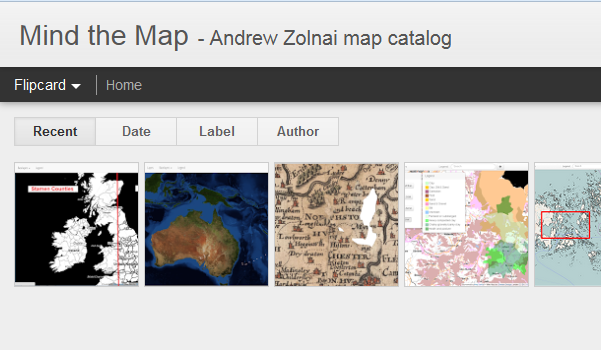pygeometa is a new open source Python package to generate metadata for geospatial datasets. Users can manage simple configurations to generate geospatial metadata in a variety of formats. Features: simple configuration: inspired by Python’s ConfigParser extensible: template architecture allows for easy addition of new metadata formats flexible: use as a command-line tool or integrate as a library pygeometa is available ...
Read More »Tag Archives: metadata
pycsw 1.10.0 released
The pycsw team announces the release of pycsw 1.10.0.The 1.10.0 release brings significant features, enhancements and fixes to the codebase, including: support OGC OpenSearch Geo and Time Extensions standard support for Open Archives Initiative Protocol for Metadata Harvesting (OAI-PMH) support spatial dateline queries better support for geospatial links via the Python geolinks library fix CSW harvesting to harvest full records ...
Read More »pycsw 1.8.0 released
The pycsw team proudly announces the release of pycsw 1.8.0 codenamed "data". This release powers the data CSW endpoints. data is the home of the U.S. Government's open data.
The 1.8.0 release brings significant features, enhancements and fixes to the codebase, including:
- support for PostgreSQL Full Text Search
- support for repository filtering
- support for PostgreSQL schemas other than 'public'
- implement database connection pooling for WSGI
- more robust native model
- fix csw:AnyText population to be finer grained for OGC data services
- fix UTF-8 handling in configuration
The full list of enhancements and bug fixes is available here. pycsw is an OGC CSW server implementation written in Python. pycsw fully implements the OpenGIS Catalogue Service Implementation Specification (Catalogue Service for the Web). Initial development started in (more formally announced). The project is certified OGC Compliant, and is an OGC Reference Implementation. pycsw allows for the publishing and discovery of geospatial metadata. Existing repositories of geospatial metadata can also be exposed via OGC:CSW 2.0.2, providing a standards-based metadata and catalogue component of spatial data infrastructures. pycsw is Open Source, released under an MIT license, and runs on all major platforms (Windows, Linux, Mac OS X). The source code is available here. Testers and developers are welcome. The pycsw developer team.

Releasing data really works, Part VI
Bloggage update: Three months into posting data on my web service, I created a short list of free data for Great Britain on my Map Catalog called GB Freebie. While that post details the offering, let's review here some lessons learned in using Mapcentia stack on AWS. It further illustrates how relatively easy it is to post freely available datasets "with a little help from my friends"... So go ahead and explore more from many other free data sources!

SuperGIS DataManager 3.2 Upgraded for Powerful Data Management Functions
Supergeo Technologies, the leading global provider of complete GIS software and solutions, released the enhanced GIS management tool, SuperGIS DataManager 3.2, providing users with rich and powerful data management functions.
SuperGIS DataManager 3.2 is a useful GIS data management tool, supporting users to read and handle diverse formats of vector or raster data such as GEO, SHP, DXF, DWG, DGN, ECW, SID, TIF, JPEG and so forth. In addition, it also allows users to rapidly copy, move, and delete the files in the data management tool.
Key features of SuperGIS DataManager 3.2 include improved geodatabase management, the integration with SuperGIS Toolkit, supporting to search layers by file name, and importing/exporting metadata. Therefore, users are able to analyze and process data more efficiently.
Several commonly used geodatabase are supported by SuperGIS DataManager 3.2, such as Personal Geodatabase (MDB), Microsoft SQL Server, Oracle Spatial and Postgre SQL. Users are allowed to browse and manage files within geodatabase and export layer data to the database.
SuperGIS DataManager 3.2 is the GIS data management tool provided by SuperGIS Desktop 3.2. After installing SuperGIS Desktop 3.2, users can apply SuperGIS DataManager 3.2 freely.
# # #
About Supergeo
Supergeo Technologies Inc. is a leading global provider of GIS software and solutions. Since the establishment, Supergeo has been dedicated to providing state-of-the-art geospatial technologies and comprehensive services for customers around the world. It is our vision to help users utilize geospatial technologies to create a better world.
Supergeo software and applications have been spread over the world to be the backbone of the world’s mapping and spatial analysis. Supergeo is the professional GIS vendor, providing GIS-related users with complete GIS solutions for desktop, mobile, server, and Internet platforms.
Read More »Standards & Metadata, Part VIII
Bloggage update: My previous post on Standards and Metadata stated how careful documentation and appropriate metadata high-grades any information that is shared online by giving origin, context and other information. It helps build bridges and I quipped a well-known tear down this wall that also closed my second last post on free data and apps.
Releasing data really works, Part V
Bloggage update: It took five days (after hours) to stand up, learn, tweak and display my East Anglia Fenlands project on Mapcentia's web service. It started with a GISuser group post on LinkedIn on Monday, I used my Amazon Web Service free EC2 trial and GeoCloud2 under beta, and by Friday I had it working and styled. No small thanks to Martin Hogh's original work and help, the result is a simple yet modern and pleasing web map. Not only can I serve up the results of my round-trip Ordnance Survey polygon corrections, but I can also serve up my East Anglia Fenlands project quickly and effectively.
Read More »Releasing geodata really works, Part IV
Bloggage update: Over a year ago I QC'd UK Ordnance Survey data for East Anglia, and sent the polyline spike and kickback errors to the Agency, who posted the corrections this year. They noted the errors I reported fell below their own QC criteria, but they invited me to retest their updated dataset. If results were very good in, with 25 errors out of 1777 polygons, they were even better in the update at only 1 spike out of 1779 polygons! Again, making public data available does help spur on data improvements, and online data validation helps identify errors quickly and efficiently. This makes it easier for the public to communicate, and for data custodians to high-grade their holdings.
Read More »Releasing data really works, part III
Bloggage update: More and more free data are available that are quality-controlled and verifiable. Guardian Data Blog's @smfrogers (now at Twitter) was quite sanguine about this: "Comment is free, but facts are sacred". This reflects the geo-industry's credo is "say what you want, but ensure your data's Triple-A rating: available, accurate and auditable."
Guardian Data posted Great Britain's train station data, and they used Google Fusion Tables to post some of the data. I downloaded the data set, mapped it against UK post code data from Doogal UK to place stations at post code centerpoints, and classified it by year and frequency. UK Ordnance Survey County and District data, and NOAA GSHHS coastal outline subset completed the picture. The maps were created on ArcMap for Home Use. then posted on arcgis. giscloud loader for ArcMap data was then used to post it online here and below, together with USGS SRTM web map service for background.
This is yet another example where posting data and making it publicly available can move forward map making through mashups of various data sources. The key proviso, however, is that data sources are acknowledged all the way. Not only will it allow auditing and referral, but it also allows others to create more of the same according to their particular expertise. Isn't that, after all, what crowdsourcing is all about?
pycsw 1.6.0 released
The pycsw team announces the release of pycsw 1.6.0. The 1.6.0 release brings numerous features, enhancements and fixes to the codebase, including: * Nabble community forum now available via OSGeo * fix broken connection in pycsw.admin.optimize_db * native PostGIS geometry support * new community section on website * Web Accessible Folder (WAF) harvesting support * added spatial ranking for spatial queries * added lxml 3 support * fixes for new OGC CITE tests * added support for SOS 2.0.0 harvesting * added support for SOS 1.0.0 harvesting * added database specific unit tests * added support for nested OGC Filter queries * fixed ISO output/safeguarding extent elements * fixed parameterization of OGC Filter queries * fixed fulltext search to dump only XML element values * added flexibility to pycsw.admin.setup_db to handle use cases from calling applications, like specifying extra columns, skipping SFSQL setup, etc. * added support for ISO 19115-2 (gmi) harvesting * FGDC, Atom, and DIF are now core supported outputschema formats, and do not need to be explicitly set in configuration * added CIDR notation support for CSW transactions * enhanced link support when harvesting OWS endpoints * fix tighten Dublin Core writer when checking on dumping XML * fixed harvesting logic for unsupported typenames * fixed GetRecords typename handling to _not_ behave like a record filter, but as a query model * harvesting support for RDF Dublin Core * fixed Harvest operation parameter checks in HTTP GET mode * added timeout flag to pycsw-admin.py post_xml command * continuous integration testing (using travis-ci) * modular Python logging capability * paver implementation for developer tasks This release also moves pycsw forward as an OSGeo project in incubation. pycsw is an OGC CSW server implementation written in Python. pycsw fully implements the OpenGIS Catalogue Service Implementation Specification [Catalogue Service for the Web]. Initial development started in (more formally announced). The project is certified OGC Compliant, and is an OGC Reference Implementation. pycsw allows for the publishing and discovery of geospatial metadata. Existing repositories of geospatial metadata can also be exposed via OGC:CSW 2.0.2, providing a standards-based metadata and catalogue component of spatial data infrastructures. pycsw is Open Source, released under an MIT license, and runs on all major platforms (Windows, Linux, Mac OS X). Source and binary downloads: ---------------------------------------- Testers and developers are welcome. The pycsw developer team.Read More »